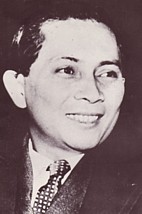Sutan Syahrir
| Sutan Syahrir | |
|---|---|
 |
|
| 1st Prime Minister of Indonesia | |
|
In office 14 November 1945 – 3 July 1947 |
|
| President | Soekarno |
| Preceded by | Office created |
| Succeeded by | Amir Sjarifoeddin |
| 2nd Interior Minister of Indonesia | |
|
In office 14 November 1945 – 12 March 1946 |
|
| President | Soekarno |
| Preceded by | R.A.A. Wiranatakusumah |
| Succeeded by | Sudarsono |
| 2nd Minister of Foreign Affairs of the Republic of Indonesia | |
|
In office 14 November 1945 – 3 July 1947 |
|
| President | Soekarno |
| Preceded by | Achmad Soebardjo |
| Succeeded by | Agus Salim |
| Personal details | |
| Born |
5 March 1909 |
| Died | 9 April 1966 (aged 57) |
| Nationality |
|
| Political party | Socialist Party of Indonesia |
| Spouse(s) | Maria Duchateau Siti Wahyunah |
| Profession | Politician |
| Religion | Sunni Islam |
Sutan Sjahrir (5 March 1909 – 9 April 1966), an avant garde and idealistic Indonesian intellectual, was a revolutionary independence leader. He became the first prime minister of Indonesia in 1945, after a career as a key Indonesian nationalist organizer in the 1930s and 1940s.
Although Sjahrir was one of the most significant Indonesian politicians of his time, he did not engage in politics through a sense of vocation nor out of interest, but rather through a sense of duty to his country and compatriates and commitment to his democratic ideals. Described as an omnivorous intellectual Sjahrir had education at the heart of his passion.
"I really find teaching the greatest work there is, for helping young people to shape themselves is one of the noblest tasks of society." Sutan Sjahrir.
Sjahrir was a close associate of the older statesman Mohammad Hatta, a key leader of the Indonesian revolution and leader of the Indonesian underground resistance during the Japanese occupation. When in his fifties his relationship with Soekarno deteriorated Sjahrir was gaoled. He died in exile.
Sjahrir was born in 1909 in Padang Panjang, West Sumatra. He was born to a Minangkabau family from Koto Gadang, Agam. His father was the chief public prosecutor in Medan and advisor to the Sultan of Deli. His eldest half-sister Siti Rohana (nicknamed the Minangkabau Kartini) was an advocate for women's education and a journalist with the first feminist newspaper of Sumatra. He studied (ELS and MULO) in Medan and in 1926 (AMS) in Bandung. During his school years in Medan, he was a violinist in Hotel de Boer at night. In Bandung he became co-founder of the 'People's University', battling illiteracy and raising funds for the performance of patriotic plays in the Priangan countryside.
...
Wikipedia
